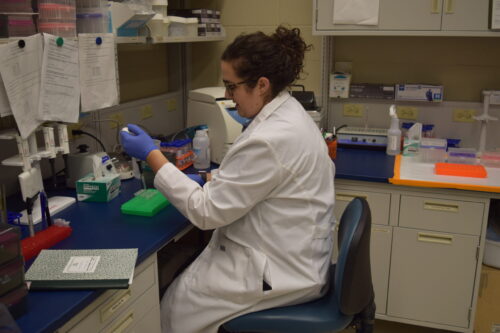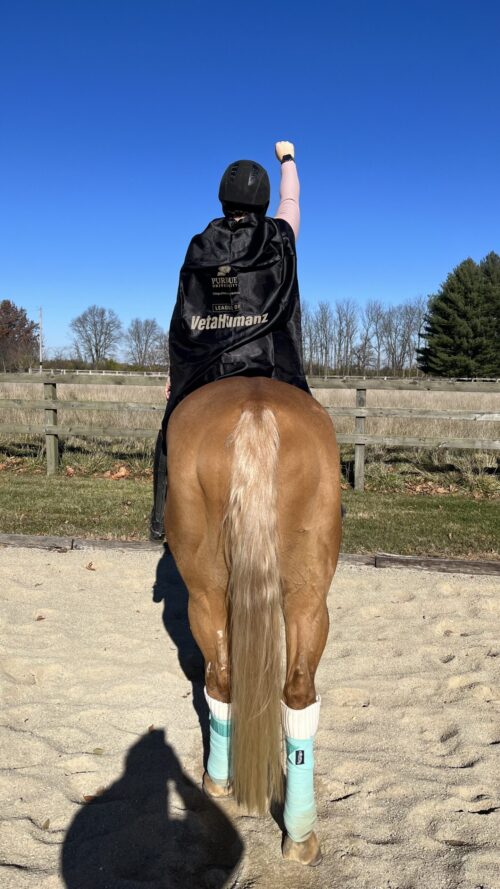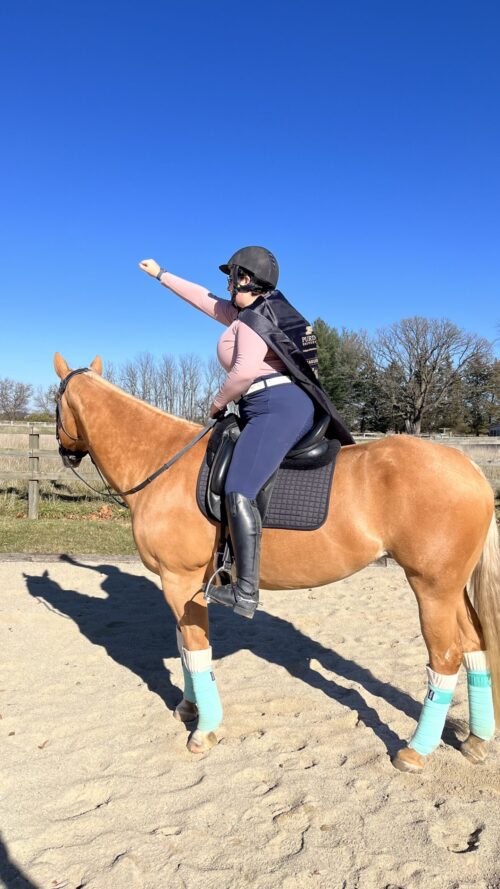DOCTOR HORSEGIRL
Dr. Rebecca Bishop
Postdoctoral Research Associate, University of Illinois at Urbana Champaign | DVM 2017, Tufts Cummings School of Veterinary Medicine | MS 2021, University of Illinois at Urbana Champaign | PhD in progress, University of Illinois at Urbana Champaign
My Story
Like many, I always wanted to be a veterinarian, but my career path within veterinary medicine evolved over time. Horses have been a focal point in my life since I first started riding as a child, but I was strongly discouraged from equine practice by veterinarians before and during vet school, so I thought that I would go into small animal general practice. Ultimately, I realized that at the end of the day I wanted to work on horses. I decided to pursue training as an equine surgeon, because I wanted to work in a veterinary teaching hospital, and I enjoy fixing things with my hands! During my specialty internship and surgical residency, I was introduced to my clinician-scientist mentors who fostered my curiosity about improving diagnosis and treatment of equine diseases and encouraged me to pursue additional research training.
My Struggles
The VIRMP (“the match”) was a struggle for me, as I did not match for a residency or specialty internship the first year I applied. I wasn’t prepared for the following process (“the scramble”) and had to quickly pivot to evaluate what opportunities might still be available to me. Learning to manage my perfectionist tendencies has been my other biggest challenge, especially as I contended with increasing pressures during internship and residency. I tend to be perceived as very confident, but internally I am often wrought with anxiety and self-doubt. I’ve had to learn how to manage my internalized expectations and self-criticism, without projecting such impossibly high standards onto my team. I have actively worked to cultivate an open and honest communication style, especially around mental health and wellbeing issues.

My Heroes
I count horses among some of the most important teachers throughout my life, including communication, cooperation, mindfulness, and perseverance. As a young rider, you learn very early that if you fall off, you must get back on the horse. I was not the most gifted rider, and so I did fall off quite a lot. Learning to pick myself up and carry on has given me self-confidence and persistence that continues to define my personality as an adult. I am also fortunate to have had mentors through each step of my training who encouraged my personal and professional development as both a clinician and scientist.
My Typical Day
In my current role, most of my workday is focused on my PhD research and I am currently studying for my surgery board exam. I typically get up around 6am and spend an hour or two studying or writing at home before heading to the hospital. Some mornings I attend or teach classes for the equine medicine and surgery residents and interns, or I might help with treadmill exercising research horses for my advisor’s study. For most of the day I am either at my desk working on grants, data analysis, or research papers; or I am in the lab processing and analyzing samples. I try to wrap up my day between 4-6pm, and then I’ll head to the barn to care for and ride my horse. After that, it’s home for a late dinner and either a bit more studying or unwinding with a TV show, book, or podcast.

My Stressors
Working as an equine vet can be quite dangerous, especially when working with patients who are scared and in pain, and at times I still draw on my early horseback riding training for the confidence to get back in the (metaphorical) saddle. In research, the challenges are more mental, but there are many times when an experiment doesn’t turn out as expected and we must be able to take what we have learned and move on to face the next challenge. Just as I learned to face my fear and try again in riding, in research I am persistent in resubmitting a grant, trying a different approach, or re-writing a paper until I achieve the desired outcome. Another stressor is the elusive concept of “work life balance”, or as I prefer to think of it, integration of work and personal life. At this stage in my career, to be successful in achieving my goals I often need to do some work on nights and weekends. Despite that, I prioritize riding my horse 3-5 days a week for both my physical and mental health. I also set aside defined time to spend with my spouse. During my first year of residency, we started a tradition of having frozen pizza and watching a TV show together on Friday nights, and I am sure to “schedule in” this time to unwind and reconnect at the end of each week.
My Why
My favorite part of being an equine veterinarian is getting to help horses through medical crises and send them back home to their owner. Horses are unique in that they are both companion and agricultural animals. Whether I am treating a child’s pony, high-performance racehorse, or Amish plow horse, each has both emotional and economic value to the owners, and I get to help preserve that human-animal bond by providing veterinary care. I also love the flexibility of the many career paths open to veterinarians. Through my research pursuits, I have been able to connect and collaborate with scientists outside of the veterinary community, and I have been fortunate to have opportunities to travel to present my research and connect with colleagues across the world.

